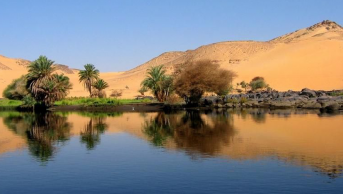Bridging over ‘Turbulent Waters’: The Road towards Water Security in the Middle East
The debate around the concept of water security continues to evolve each day. A World Bank report this month (Sadoff, Claudia W., Edoardo Borgomeo, and Dominick de Waal. 2017. Turbulent Waters: Pursuing Water Security in Fragile Contexts) successfully demonstrates the links between the concept of ‘fragility’ and ‘water security’ through a number of explanatory cases.
According to the Report, in a nutshell, the three main mechanisms by which water insecurity and fragility inter-act are critical to understand the ways out of the ‘vicious circle’ of water insecurity and fragility: (1) failure to provide citizens with basic water services; (2) failure to protect citizens from water-related disasters; and (3) failure to preserve surface, ground and transboundary water resources.
Thus, water security is not a utopia If these challenges are overcome. But there is an impasse in front of us. ‘Water security is more difficult to achieve in fragile contexts—and the failure to achieve water security has greater consequences in fragile contexts’. This statement appears to be the main axis of the Report. An array of factors, including weak institutions and information systems, strained human and financial resources, and degraded infrastructure in fragile contexts makes water security more difficult to attain. Furthermore, the report states, ‘at the same time, failure to achieve water security is potentially more damaging in fragile contexts, where populations are particularly vulnerable to the direct impacts of water insecurity, and where water insecurity can intensify perceptions that the government is unwilling to or unable to meet the needs of its citizens—thereby weakening the social compact between the government and citizen groups and acting as a destabilizing force and risk multiplier.’
According to authors, since the challenge is ‘not only one of securing adequate resource provision with equitable benefits, but also of mitigating the hazards that water presents to certain populations where it is not well managed’, water security is different from concepts of food security or energy security.
The Report uses the World Bank’s World Development Report 2011 on Conflict, Security, and Development definition of fragility: “periods when states or institutions lack the capacity, accountability, or legitimacy to mediate relations between citizen groups and between citizens and the state, making them vulnerable to violence.” It is basically a‘risk-based approach’which acknowledges that fragility: (1) has multiple dimensions that are not limited to state institutions; (2) spreads beyond low-income countries and national borders; and (3) is associated with patterns of risks that need to be identified and addressed to be more effective at preventing violent conflict.
There are mainly two solutions that authors come up with: investments and third-party facilitation. As to the former the Report reads, ‘carefully designed investments in water security can contribute to reversing the vicious cycle, promoting stability and an escape from fragility. In particular, investments that deliver basic services and preserve access to sustainable water resources are needed for communities in fragile and conflict-affected states – both as an urgent development priority and as a tangible demonstration of governments’ ability and willingness to meet the needs of its citizens.’ Water security investments can also increase the resilience against water-related crises and prevent countries from countries from further fragility.
Regarding the latter, the Report underlines the significance of domestic dynamics. Also, trust between national (ministries within a state) or international players (such as states) cannot be built solely by third parties. Still, however, there is a role for international actors as third-party intermediariesin situations of conflict and discontent, according to the Report: international third-part facilitation can ‘provide external support and incentives that are sensitive to the context of the conflict and help build resilience to environmental, economic, and social stressors’. Promotion of transparency of data, which could be very difficult to achieve, particularly in the management of transboundary water resources, is another equally important contribution that international intermediaries can make.
It is out of question that investment is one of the key towards water security. But, investments should be understood in a broader sense where soft investments such as institutional capacity building activities should be taken seriously. It is the case, for instance, in many parts of the Middle East that there is ample ‘hard’ investment, i.e. water related infrastructure. However, the problem is more related with maintenance and management of this available infrastructure, with sufficient number of knowledgeable personnel. An illustrative case is the sub-optimum utilization of wastewater treatment facilities in a number of countries, due to lack of such technical personnel. As to the third-party involvement, the Middle East is –perhaps- not the perfect place for outside interventions, particularly with regard to transboundary water resources.For many countries, third-party role is nothing different than a new form of imperialism. Also, the neutrality of third-parties can be a problematic issue. In such circumstances, then, third-party intermediation can backfire in a typical Middle-East context.
To conclude, while the findings of the Report elucidates on the main path out of water security, we need more tailor-cut solutions for settings like the Middle East which achieved at least ‘some’ level of infrastructure and also have deep histories of (de)colonization.









